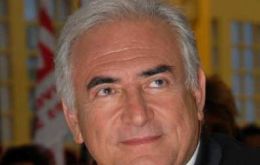MercoPress. South Atlantic News Agency
Economy
-
Monday, October 13th 2008 - 20:00 UTC
Asian test of weekend financial decisions reacting positively
Asian markets have reacted positively to efforts by world leaders to end the recent financial turmoil. Sydney's benchmark index leapt 5.5%, as markets in South Korea and Singapore opened up around 3%. Tokyo's market was closed for a public holiday.
EU leaders earlier said no big bank would be allowed to fail, as they agreed a plan to tackle the crisis. -
Monday, October 13th 2008 - 20:00 UTC
Argentine “soy king”: export duties makes farming “non viable”

Argentina's “Soy King”, Gustavo Grobocopatel warned that if export taxes remain averaging 35%, and commodities don't recover prices of early 2008, next year many people will be going bankrupt because with current costs oilseeds production “is not viable”.
-
Monday, October 13th 2008 - 20:00 UTC
Bush critic and trade expert Nobel Prize for Economics

United States economist Paul Krugman, a well-known critic of the President George Bush administration for policies that he argues led to the current financial crisis, won the 2008 Nobel Prize for economics on Monday.
-
Monday, October 13th 2008 - 20:00 UTC
China record trade surplus but exports growth rate slower

China's trade surplus widened to a record 29.3 billion US dollars in September as exports withstood the global economic slowdown and falling commodity prices reduced the import bill.
-
Monday, October 13th 2008 - 20:00 UTC
IMF: now to work on limiting damage to real economy

Coordinated global action is starting to reverse the tide of the financial crisis, but governments also need to “deploy all instruments” to limit damage to the real economy, IMF Managing Director Dominique Strauss-Kahn told world financial leaders meeting in Washington.
-
Monday, October 13th 2008 - 20:00 UTC
Argentina blames IMF for poor supervision in rich countries
Argentina's Economy Minister Carlos Fernández, not known for his loquacity, spoke at large about the international financial market meltdown during the IMF and World Bank annual assemblies in Washington.
-
Monday, October 13th 2008 - 20:00 UTC
Lula da Silva hails Brazil's solid financial position

The days when emerging economies were depended on the International Monetary Fund, IMF “are over” and so are over the days when Latinamerica had no voice in international affairs, said Brazilian president Lula da Silva in Spain.
-
Sunday, October 12th 2008 - 20:00 UTC
Talks to consolidate US automakers GM and Chrysler
The Unites States automobile giants General Motors and Chrysler are in talks about a possible merger, according to reports in the US media. Apparently talks have been going on for a month but details of the deal are not clear and neither party has made any direct official comments.
-
Sunday, October 12th 2008 - 20:00 UTC
Economic reforms for rural China include land transfer and rent
China's Communist Party leaders agreed on a package of rural reforms that could shape the country's economic policy over the coming years. A four-day enclave including President Hu Jintao had approved “major issues” on reform, Xinhua news agency said.
No details were given but it is thought farmers will now have more power to transfer or rent out their land. -
Sunday, October 12th 2008 - 20:00 UTC
IMF hails G7 accord as “first big success in coordination”
World financial leaders endorsed on Sunday an action plan announced by the seven leading advanced economies to combat the international financial crisis in what IMF Managing Director Dominique Strauss-Kahn called the “first big success in coordination” to halt the downward spiral in world markets and support the global financial system.
